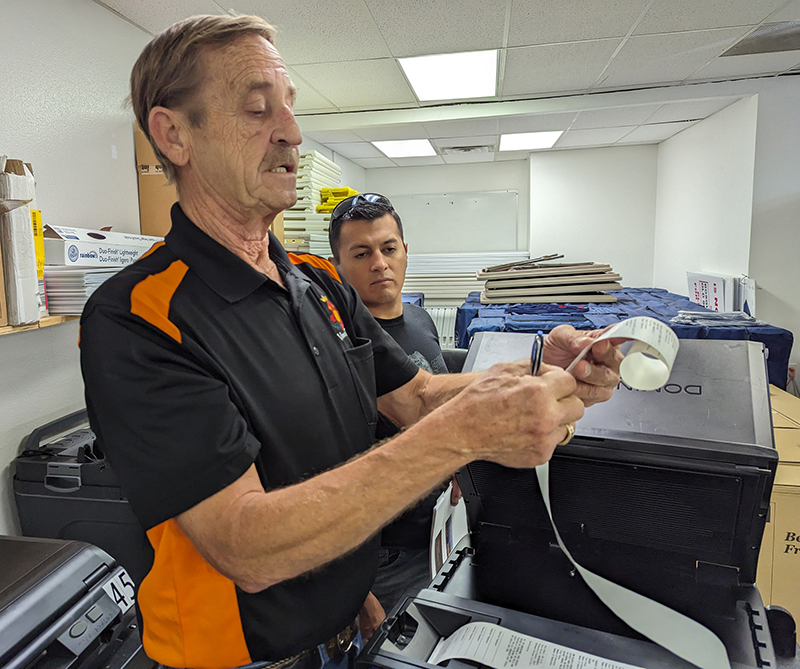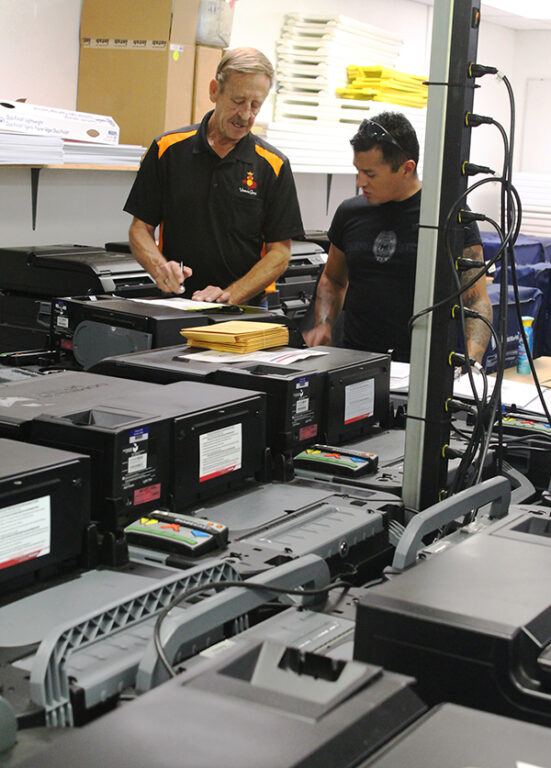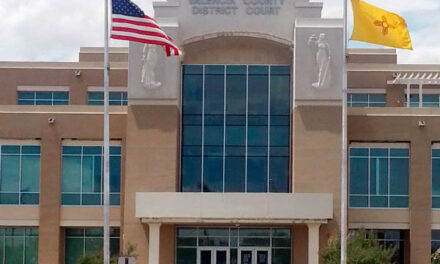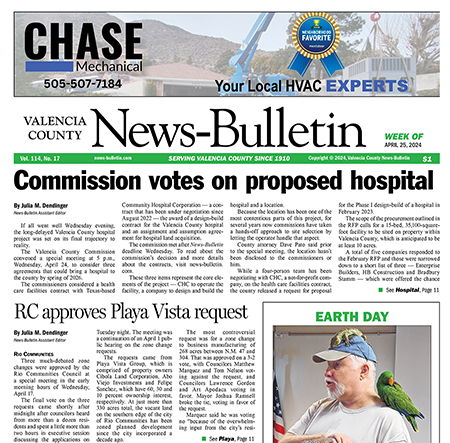In a small, locked, windowless room on the west end of the Valencia County treasurer’s office are the counters of democracy in Valencia County.
Fifty-five Dominion vote tabulators sit in neat rows, batteries on a trickle charge, waiting to be disbursed around the county for yearly elections.
For the last few weeks, Valencia County Clerk Mike Milam and Paul Ortiz, county bureau of elections clerk, have been performing the monotonous but important job of certifying all the machines for this year’s local election.
“It’s a bit slow and tedious, but it’s for the protection of the voters,” said Milam.

Part of the detailed process and checks and balances of certifying tabulators in preparation for an election include running a test print tape that shows all the races and questions on the ballot having zero votes. Both Valencia County Clerk Mike Milam, foreground, and bureau of elections clerk Paul Ortiz, background, check the tape for all 55 machines to make sure the memory cards are property zeroed out. (Julia M. Dendinger | News-Bulletin photos)
Once the tabulator is powered up, basic information like the date and time is checked. While nothing needs to be changed on the early voting tabulators, the ones going out to the county’s 14 voting convenience centers need to be reset since Daylight Saving Time ends on Sunday, Nov. 5, and clocks “fall back” an hour, two days before Election Day on Nov. 7.
The serial numbers on the back of each tabulator are matched to a set of memory cards — a main card and back up — and the cards are inserted into the machines.
“The cards are zeroed out but we run a test tape to make sure,” Milam said.
The tapes show the names for every candidate and question on the ballot for the upcoming elections and next to each one should be a zero.
“It should be zeros all the way down the line. If it’s not, we pull it out and we send it off to Dominion,” the clerk said.
They check that the battery back-ups are topped off and holding a charge, make sure the thermal printer is loaded with a fresh roll and that there’s a new ink cartridge for the Image Cast equipment that helps voters with visual and hearing impairments vote easily.
Milam said if a voting location were to lose power, the batteries will keep a tabulator running for three to four hours. Should power not be restored and the battery run out, there is an emergency ballot bin on the back of the machines. A presiding judge unlocks and unseals the emergency ballot collection box and the paper ballots are dropped in.
Once power is restored, a poll worker feeds the marked ballots into the tabulator for counting.
The slowest part of the process is hand-feeding 183 test ballots through each machine to test for a variety of errors and problems. The “test deck” is provided by Dominion and comes printed with pre-made errors and mistakes, designed to test the system for issues such as over counts, under counts and blank ballots.
The deck contains 25 different ballot “styles” accounting for the variations voters can be issued depending on where they are registered to vote. After the test deck is put through, five copies of the “results” tape are printed and each one is checked against an answer key with the expected vote numbers for a list of faux candidates that need to match up exactly.
“Again, if one of the numbers don’t match, we pull the machine out and send it back to Dominion. It’s up to them to figure out what the issue is. We’re just here to certify the machines,” Milam said.

Valencia County Clerk Mike Milam, left, and bureau of elections clerk Paul Ortiz, right, review the certification check list they must go through for each tabulator before the machines are sent out to polling locations for the upcoming local election.
Once the test ballots are run, the main memory card is removed from the machine and the printed tapes are taken across the street to Candace Teague, the county’s bureau of elections director. She then uploads the test results to a secure Dominion website, Milam said, which checks the results against what the test deck is supposed to produce. Once that is done, the card is zeroed out again, and when it’s returned to the tabulator, the information on the back-up card is also erased.
At that point, the access doors are closed off with plastic loop seals that have the same serial number as the machine and memory cards. Those seals are only removed by a poll worker when the machine is closed out the last time and the cards are removed and brought to the county clerk’s office for upload to the New Mexico Secretary of State’s Office secure election system.
Each machine goes out to a voting location with a copy of a certification check-list, which will be completed by Milam or Ortiz. The list also has the tabulator’s serial number written on it, so poll workers can check it against the memory card seals and the number on the back of the machine.
“If those numbers don’t match, the machine isn’t used,” the clerk said. “All this shows proof that everything’s been locked down, that no one had access to it. If that seal gets broken before it should be, the machine is going to be set aside and we’ll use a back up. Typically, we have two active voting machines at each location and one spare.
“I feel 100 percent confident we have a secure election,” the county clerk said.
After the 2018 mid-term elections, New Mexico was ranked at No. 9 for elections performance on an index maintained by the Massachusetts Institute of Technology.
Following the 2020 presidential election, the state was at No. 25, seeing a two-point drop from an EPI average of 83 percent to 81 percent. For comparison, New Mexico was ranked at No. 38 after the 2014 mid-terms and No. 28 following the 2016 presidential.
The Elections Performance Index tracks information such as voter turnout and registration rates, registration and absentee ballot problems during an election, whether post-election audits are required and voting wait time.
Milam reminds voters there are a number of ways to cast a ballot — absentee, by mail; early, in person and on Election Day — and urges people to vote.
“We have almost a whole month — 28 days — to vote. I wish more people would get out and vote. It’s a privilege and an honor to vote. Exercise your privilege,” Milam said.
The clerk said many people tell him they don’t vote because “their vote doesn’t count. How many races have been won by one vote? It counts.”
Julia M. Dendinger began working at the VCNB in 2006. She covers Valencia County government, Belen Consolidated Schools and the village of Bosque Farms. She is a member of the Society of Professional Journalists Rio Grande chapter’s board of directors.


















